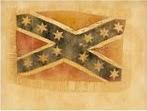 As a footnote to what I just posted about the seeming rise, in many places of the world, of overtly racist and homophobic movements that seem to hark back to political experiments many of us hoped the human community had put behind itself:
As a footnote to what I just posted about the seeming rise, in many places of the world, of overtly racist and homophobic movements that seem to hark back to political experiments many of us hoped the human community had put behind itself:Frank Cocozzelli recently published the next installment in his ongoing series of articles about the neo-Confederate philosophy of right-wing Catholic political activist Thomas E. Woods. This previous posting of mine about Frank's previous articles in this series provides links to those articles.
As Frank notes, Woods bridles when Frank describes him as a neo-Confederate. Yet his prescription for the perceived ills of the American political system at present is eerily like the Confederate prescription of the 19th century (and Woods has expressed open admiration for the Confederate rebellion against the Union): it envisages the dismantling of the Union by factions intent on holding the government hostage until it does the wills of those factions.
Frank writes,
What Woods is actually advocating is giving factions the power to hold popular government hostage. Factionalism does not arise out of the Enlightenment ideal of reason and the pursuit of rational self-interest (as opposed to the unfettered laissez-faire self-interest favored by conservatives and those further Right). Instead, it rears its ugly, destructive head when unchecked emotion controls group actions. Indeed, the contemporary Religious Right is increasingly resorting to factionalism to get its way; much like a child throwing a tantrum when it is told they cannot do something destructive to others.
And, interestingly enough, as Steve Benen reports yesterday for the Maddow Blog, Rand Paul--who has been frank about his misgivings re: the legacy of Lincoln--was also in bridling mode recently, when CNBC's John Harwood grilled Paul about his connections to neo-Confederate activist Jack Hunter aka "the Southern Avenger."
Hunter has openly advocated secessionism along the models of the Confederacy, and has expressed in writing his admiration for the Confederate rebellion against the Union. As Benen notes, Hunter, who boasts of his close connection to Mr. Paul, "used to make public appearances in a Confederate flag wrestling mask and has boasted that he raises 'a personal toast every May 10 to celebrate John Wilkes Booth's birthday.'"
I can well imagine that Paul would want to dissociate himself from Hunter as more of Hunter's past becomes known to the public. But when something walks like a duck and quacks like a duck, the public is perhaps wise in reaching the conclusion that it actually is seeing a duck--a basic principle of common sense that Messrs. Woods and Paul might be well-advised to keep in mind as they craft their political statements and agendas.

